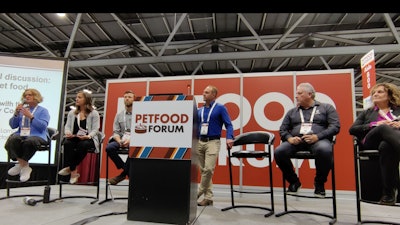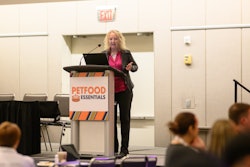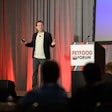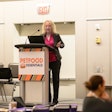
In 1987, the United Nations Brundtland Commission defined sustainability as “meeting the needs of the present without compromising the ability of future generations to meet their own needs.” Since that nebulous description, sustainability has come to include a wide range of specific environmental, social and economic issues. That multiplicity can make it confusing when individuals aim to start a sustainability initiative within their pet food industry business.
A panel of experienced pet food professionals shared their advice on how to filter the green torrent and find a sustainability plan that meets a specific company’s needs, during the Ask the Pet Food Pro panel discussion: Making sustainable pet food at Petfood Forum 2024 in Kansas City, Missouri. Jim Lamancusa, executive director of the Pet Sustainability Coalition, hosted the discussion.
Question: How do you recommend that pet food brands get started on their sustainability journeys?
Stephie Volo, chief impact officer, Earth Animal
"You need everybody in the company to be included."
Sustainability means so many different things to so many people that it really needs to come from, 'What is most meaningful to the company? What are the company's values? What are your company's mission, purpose and vision? and what's meaningful to you?' but also, to integrate a sustainability strategy across your company, you want your whole team's buy-in. You want them to be connected, because it's cross-functional, it's cross-departmental, and you need everybody in the company to be included. So you may want to work with an organization like the Pet Sustainability Coalition, to survey your team to ask them questions about what sustainability means to them. What would they like to see your company focused on? What would they like to see your company uplift around social and environmental performance? So that would be one actual way initiative that I would recommend that people who are just getting our companies that are just getting started on their sustainability journey to start?
Elizabeth Maier, director, growth and innovation, Wilbur-Ellis Nutrition
"It's okay to be at stage zero."
I'm on the supplier side of this whole story. And the best advice I can give is, as a supplier, it's to work with your customer. So oftentimes, the brands are the most in touch with what's being asked for by the consumers, because they're the ones with the market research. They're the ones who are directly getting information all the time. As a supplier, sometimes you can forget that your ultimate end customer is the consumer. And so it's really important to talk to your current customers to your future customers, what are they being asked for, and then raising our game as suppliers to meet their needs, because they can't, they can't meet the consumers demands without us being where we need to be. And this isn't a commercial for PSC, but we have a lot more resources than we used to have to help us with this. It's okay to be at stage zero. I think that's what in this industry, we need to be okay with that. We all need to start somewhere and organizations like PSC or AFIA. iFeeder has a toolkit now to help with sustainability. These are people and places that can help us start from square one.
Adam Craig, director of product development, Hill’s Pet Nutrition
"It's really about taking a data-driven approach."
When I think back to when we started our sustainability journey, Hill's Pet Nutrition, which goes back to 2019, one of the first things is figuring out what your baseline is. So I completely agree, and the first step is, ‘what are your priorities?’ Because as we said, sustainability can mean a lot of things. So, what are your priorities? But then quickly figuring out what is the baseline for you as a company? And what are your goals and objectives? And for us, it's really about taking a data-driven approach, like so much else we do in this industry use data to help with a baseline assessment. And then that starts to lay the foundation for where you focus your energy and resources to make improvements because there are a lot of shiny objects out there that you can go after, which may seem great, but may not make a big impact or as big of an impact as you're hoping when you get the data. I think that that foundational knowledge is core to really doing this the right way.
Brian Steinwagner, executive vice president with sustainability responsibilities, Morris Packaging
"We designed a sustainability menu."
I've been in this industry for 30-plus years. So yes, I started when I was 10. But I've seen the ebb and flow of sustainability efforts over those years. Right now, we're on the peak of it. Going through those ebbs and flows, we didn't want to come up with just one item or one thing. We designed a sustainability menu because as Stephie had said, everybody has a different objective as a company and what goals they are trying to meet. We wanted to give a menu of options that we could support, whether it's 100%, recyclable, recycled content, or maybe just right-sizing your package. We wanted to be able to support those variants and meet the goals of each company. The one that for us has had the biggest traction has been the recycled content. We've been able to provide 35% recycled content in pet food packaging at no additional cost to our customers, and only a 1% premium for 45% recycled content. So we've had a tremendous amount of traction in that area.
Shannon Landry, pet brand manager, Packaged Facts
From a consumer-insights perspective, any sustainability initiatives you do implement, you would want to get the word out, and basically, consumer education, informing people of your efforts.



















